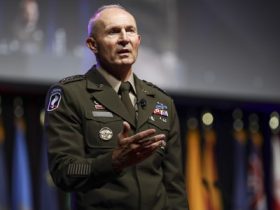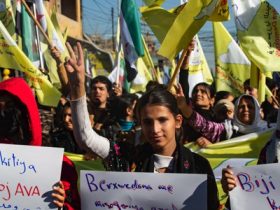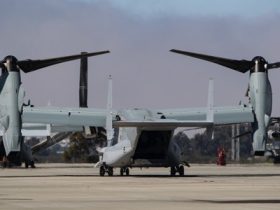BERLIN — The German government has vowed to boost vital sectors of the country’s defense industry while deepening cooperation with European allies, officials announced on Wednesday.
In a new policy document, the outgoing administration of Chancellor Olaf Scholz declared that the Russian attack of Ukraine had necessitated an update to Germany’s defense-related industrial policy. The most recent version was from 2020, two years before Moscow launched its full-scale invasion of its western neighbor.
“It is crucial for Germany’s defense capability that we have innovative and efficient defense companies in our country,” said German Defense Minister Boris Pistorius. “This is the only way we can develop state-of-the-art weapons systems — also together with our allies — and, above all, produce them in sufficient quantities,” he added.
The paper with the catchy title of “Nationale Sicherheits- und Verteidigungsindustriestrategie”— national security- and defense industry strategy – outlines key capabilities that Germany seeks to maintain within its national borders, like shipbuilding and artificial intelligence, while delegating others, including aviation and small arms, to the European or international levels.
It also proposes a stronger role for multinational procurement efforts and the joint development of advanced weapon systems.
RELATED
While German government ministries have singled out key industries in the past, the new paper names specific areas considered key national competencies that must be maintained domestically. Aside from shipbuilding, they include armored vehicles, artificial intelligence, communications, sensors, crucial IT services, and electronic warfare. Maintaining these is essential for the “maintenance and strengthening of the strategic sovereignty and capacity to act of the Federal Republic,” the report states.
The German economy has been struggling through a prolonged period of stagnation, resulting in fears over whether Germany will be able to maintain its status as an industrial powerhouse. The strategy paper seeks to “open a new chapter in the relations between the state and industry, in the spirit of the Zeitenwende,” said the defense minister, referencing Scholz’s speech shortly after the invasion of Ukraine in which he called the event a “turning point” in German and European history.
One of the objectives of the new strategy, which comes with a wish list of policy proposals, is to give arms companies more peace of mind when it comes to long-term contracts and opportunities for investment by government funds. It further identifies what the defense and economic ministries see as burdensome red tape that should be cut, and promises efforts to create more robust supply chains.
Specifically, the government calls for more funding for research and development, quicker budgetary processes, and purpose-fit funding and support for defense startups. Officials are also evaluating whether the military and other security services should be allowed to place longer-term, advance orders up to ten years to make industry planning more predictable. The paper further said the government was investigating the possibility of “capacity retention premiums” to allow for the quick upscaling of production in times of crisis.
The defense industry paper was presented by the ministers for defense and for the economy of the Scholz government. After the governing coalition broke apart last month, early elections were announced for February. Scholz’s left-of-center administration, which has been in charge since before the Russian invasion of Ukraine, presided over a 180-degree turn in German defense policy, significantly increasing defense spending and becoming more assertive on the international stage.
Linus Höller is a Europe correspondent for Defense News. He covers international security and military developments across the continent. Linus holds a degree in journalism, political science and international studies, and is currently pursuing a master’s in nonproliferation and terrorism studies.
Read the full article here








Leave a Reply